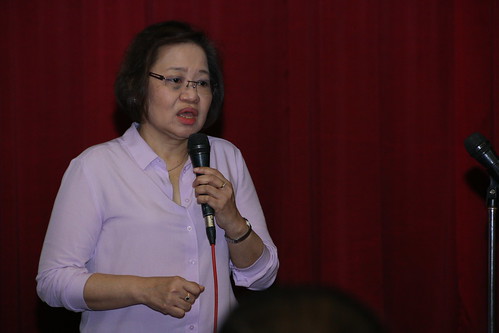Autism does not cause aggressive or defiant behavior. When it happens, the challenge can be born out of the PWA’s inability to communicate, misunderstood or unmet needs or painful biological process. Nonetheless, challenging behavior can be a source of tension in school, at home and in the workplace; and can lead to negative life outcomes. It is one of the most common challenges shared by parents of children with autism in ASP family support group sessions.
Dra. Alexis Reyes addressed this challenge in front of 69 participants at the Meralco Theater last 15 January 2017.
Dr. Reyes defined aggression as behavior that is threatening or likely to cause harm and may be non-physical/verbal (e.g. screaming, yelling, tantruming, threatening or cursing at another person) or physical (e.g. hitting, biting, or throwing objects at another person) or self-injury (e.g. head banging, pica, etc.). They could also be in the form of destructiveness (venting aggression on objects), running away or smearing. Aggression is the leading cause of institutional placement for persons with autism, fewer opportunities for independence and social relationships, exclusion, as well as stress among caregivers, family members and teachers.
She further explained that there were generally 2 sub-types of aggression: the Predatory or Proactive aggression (cold aggression) which is intended to achieve a desired reward and usually occurs without anger or provocation. The other type is the Reactive or hot-headed aggression. This occurs in response to a perceived or real threat and is often impulsive and may reflect low verbal intelligence and impulsiveness. Both types of aggression seem to be responsive to medications.
Prevalence of aggression varies widely and depends on the method of assessment. She presented results of several studies made on prevalence of aggression in ASD. Aggression is common in early childhood with nearly 54% across sample cases. There is an associated increased risk of aggression for the ASD population who are more severely affected, have ritualistic behaviors and are resistant to change. Co-occurring problems or factors associated with aggression are sleep problems, gastrointestinal problems, sensory over and under sensitivity, and self-injurious behavior.

Dr. Reyes presented the results of the study she participated in as a principal investigator to evaluate the efficacy and safety of Aripiprazole in Asian pediatric patients. She said that strategies for aggression in ASD include non-pharmacologic treatments such as Functional Behavior Analysis, Reinforcement Strategies, Stimulus change (distracting the child by clapping hands or getting them to talk on the phone) and Functional Communication Training (or Crisis Communication i.e. keeping sentences 5 words or shorter) for caregivers and professionals. Pharmacological treatments include second generation antipsychotics such as Risperidone (Risperdal), Aripiprazole (Abilify), Clozapine, Olanzapine, Quetiapine, and Paliperidone. She said that generally, Risperidone and Aripiprazole are responsible for decreasing irritability and aggression. There is better awareness and longer attention with its use. However, they also tend to increase weight and sleepiness.
In summary, treatment of aggressive behaviors cannot be done with medications alone and should be done with the family. Training for those caring for the person with autism is necessary to achieve long term success. There is always hope.
“She really prepared the topic to be relevant. The goal of the seminar was achieved. The speaker spoke very well. She really discussed her topics accordingly. The place was comfortable. The seminar is organized.”
“Informative! Good recommendations!”
“Everything is good and well - explained even for a limited time.”
 Dr. Reyes presented the results of the study she participated in as a principal investigator to evaluate the efficacy and safety of Aripiprazole in Asian pediatric patients. She said that strategies for aggression in ASD include non-pharmacologic treatments such as Functional Behavior Analysis, Reinforcement Strategies, Stimulus change (distracting the child by clapping hands or getting them to talk on the phone) and Functional Communication Training (or Crisis Communication i.e. keeping sentences 5 words or shorter) for caregivers and professionals. Pharmacological treatments include second generation antipsychotics such as Risperidone (Risperdal), Aripiprazole (Abilify), Clozapine, Olanzapine, Quetiapine, and Paliperidone. She said that generally, Risperidone and Aripiprazole are responsible for decreasing irritability and aggression. There is better awareness and longer attention with its use. However, they also tend to increase weight and sleepiness.
Dr. Reyes presented the results of the study she participated in as a principal investigator to evaluate the efficacy and safety of Aripiprazole in Asian pediatric patients. She said that strategies for aggression in ASD include non-pharmacologic treatments such as Functional Behavior Analysis, Reinforcement Strategies, Stimulus change (distracting the child by clapping hands or getting them to talk on the phone) and Functional Communication Training (or Crisis Communication i.e. keeping sentences 5 words or shorter) for caregivers and professionals. Pharmacological treatments include second generation antipsychotics such as Risperidone (Risperdal), Aripiprazole (Abilify), Clozapine, Olanzapine, Quetiapine, and Paliperidone. She said that generally, Risperidone and Aripiprazole are responsible for decreasing irritability and aggression. There is better awareness and longer attention with its use. However, they also tend to increase weight and sleepiness.

 Posted in:
Posted in: 


0 comments:
Post a Comment